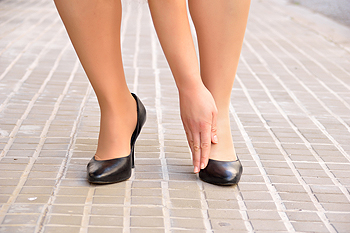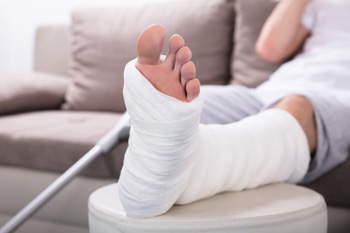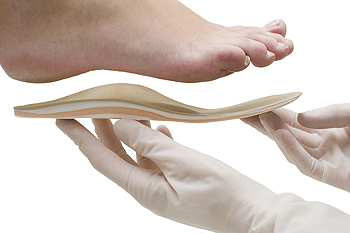November 2018
High Heels and the Achilles Tendon
 Many women enjoy wearing high heels despite having the knowledge that the feet may be negatively affected. Research has shown the Achilles tendon may become shorter and stiffness may occur as a possible result of frequently wearing high heels. Additionally, balance and posture may become affected as the center of gravity changes, and the muscles surrounding the ankle may be compromised. There may be solutions that can be implemented to protect the feet from wearing high heels, and these may include choosing to wear shoes that have a lower heel, reducing the amount of days and time spent wearing high heels, or wearing soft insoles, which may provide adequate cushioning for the feet. If you would like additional information about the effects high heels can have on your feet, please speak with a podiatrist who will be able to suggest proper foot strengthening exercises.
Many women enjoy wearing high heels despite having the knowledge that the feet may be negatively affected. Research has shown the Achilles tendon may become shorter and stiffness may occur as a possible result of frequently wearing high heels. Additionally, balance and posture may become affected as the center of gravity changes, and the muscles surrounding the ankle may be compromised. There may be solutions that can be implemented to protect the feet from wearing high heels, and these may include choosing to wear shoes that have a lower heel, reducing the amount of days and time spent wearing high heels, or wearing soft insoles, which may provide adequate cushioning for the feet. If you would like additional information about the effects high heels can have on your feet, please speak with a podiatrist who will be able to suggest proper foot strengthening exercises.
High heels have a history of causing foot and ankle problems. If you have any concerns about your feet or ankles, contact Dr. Robert Graser from Graser Podiatry and Bunion Surgery Institute. Our doctor can provide the care you need to keep you pain-free and on your feet.
Effects of High Heels on the Feet
High heels are popular shoes among women because of their many styles and societal appeal. Despite this, high heels can still cause many health problems if worn too frequently.
Which Parts of My Body Will Be Affected by High Heels?
- Ankle Joints
- Achilles Tendon – May shorten and stiffen with prolonged wear
- Balls of the Feet
- Knees – Heels cause the knees to bend constantly, creating stress on them
- Back – They decrease the spine’s ability to absorb shock, which may lead to back pain. The vertebrae of the lower back may compress.
What Kinds of Foot Problems Can Develop from Wearing High Heels?
- Corns
- Calluses
- Hammertoe
- Bunions
- Morton’s Neuroma
- Plantar Fasciitis
How Can I Still Wear High Heels and Maintain Foot Health?
If you want to wear high heeled shoes, make sure that you are not wearing them every day, as this will help prevent long term physical problems. Try wearing thicker heels as opposed to stilettos to distribute weight more evenly across the feet. Always make sure you are wearing the proper shoes for the right occasion, such as sneakers for exercising. If you walk to work, try carrying your heels with you and changing into them once you arrive at work. Adding inserts to your heels can help cushion your feet and absorb shock. Full foot inserts or metatarsal pads are available.
If you have any questions please feel free to contact our office located in Boerne, . We offer the newest diagnostic and treatment technologies for all your foot and ankle needs.
Symptoms of a Broken Foot
 Research has shown that one out of ten broken bones happens in the foot. If tripping, falling, or dropping a heavy object on your foot occurs, you may experience a painful condition known as a broken foot. You will immediately notice symptoms that may include severe pain and swelling, possibly hindering the ability to walk, and bruising or tenderness. Additionally, the toes may be deformed if the bones appear to be dislocated. If you have fallen and you think your foot may be fractured, a proper diagnosis must be performed that will confirm the broken foot. This is typically accomplished by having an X-ray taken, followed by a discussion of proper treatment methods. These may include keeping the foot stable by wearing a supportive boot. Other options may include the use of a splint or cast, and crutches would generally accompany this. If you feel you have broken your foot, it is strongly advised to speak to a podiatrist, so the correct treatment can be chosen.
Research has shown that one out of ten broken bones happens in the foot. If tripping, falling, or dropping a heavy object on your foot occurs, you may experience a painful condition known as a broken foot. You will immediately notice symptoms that may include severe pain and swelling, possibly hindering the ability to walk, and bruising or tenderness. Additionally, the toes may be deformed if the bones appear to be dislocated. If you have fallen and you think your foot may be fractured, a proper diagnosis must be performed that will confirm the broken foot. This is typically accomplished by having an X-ray taken, followed by a discussion of proper treatment methods. These may include keeping the foot stable by wearing a supportive boot. Other options may include the use of a splint or cast, and crutches would generally accompany this. If you feel you have broken your foot, it is strongly advised to speak to a podiatrist, so the correct treatment can be chosen.
A broken foot requires immediate medical attention and treatment. If you need your feet checked, contact Dr. Robert Graser from Graser Podiatry and Bunion Surgery Institute. Our doctor can provide the care you need to keep you pain-free and on your feet.
Broken Foot Causes, Symptoms, and Treatment
A broken foot is caused by one of the bones in the foot typically breaking when bended, crushed, or stretched beyond its natural capabilities. Usually the location of the fracture indicates how the break occurred, whether it was through an object, fall, or any other type of injury.
Common Symptoms of Broken Feet:
- Bruising
- Pain
- Redness
- Swelling
- Blue in color
- Numbness
- Cold
- Misshapen
- Cuts
- Deformities
Those that suspect they have a broken foot shoot seek urgent medical attention where a medical professional could diagnose the severity.
Treatment for broken bones varies depending on the cause, severity and location. Some will require the use of splints, casts or crutches while others could even involve surgery to repair the broken bones. Personal care includes the use of ice and keeping the foot stabilized and elevated.
If you have any questions please feel free to contact our office located in Boerne, . We offer the newest diagnostic and treatment technologies for all your foot and ankle needs.
Why Do My Feet Hurt After Standing During the Work Day?
 If you are standing or walking for the majority of the day as a result of your working activities, you may be familiar with the pain and discomfort your feet may experience. Specific foot conditions may amplify and become worse by standing on your feet for most of the day, including pain that may originate from corns, calluses, or certain foot deformities. There may be several options that can be enforced to alleviate a portion of the discomfort, which may include executing changes in the working environment, wearing different types of shoes or using shoe inserts, and standing on suitable floor mats instead of hard floors. Research has shown that moderate relief may be attained by performing simple foot stretches throughout the day. It may also help to elevate the feet when the work day is over, and this may aid in reducing any swelling that may be present. If you would like additional advice on how your feet may feel better while working, it’s suggested to speak with a podiatrist who will be able to provide the correct information.
If you are standing or walking for the majority of the day as a result of your working activities, you may be familiar with the pain and discomfort your feet may experience. Specific foot conditions may amplify and become worse by standing on your feet for most of the day, including pain that may originate from corns, calluses, or certain foot deformities. There may be several options that can be enforced to alleviate a portion of the discomfort, which may include executing changes in the working environment, wearing different types of shoes or using shoe inserts, and standing on suitable floor mats instead of hard floors. Research has shown that moderate relief may be attained by performing simple foot stretches throughout the day. It may also help to elevate the feet when the work day is over, and this may aid in reducing any swelling that may be present. If you would like additional advice on how your feet may feel better while working, it’s suggested to speak with a podiatrist who will be able to provide the correct information.
While working on the feet, it is important to take the proper care of them. For more information about working on your feet, contact Dr. Robert Graser from Graser Podiatry and Bunion Surgery Institute. Our doctor will treat your foot and ankle needs.
Working on Your Feet
Standing on your feet for long periods of time can cause stress and pain in your feet. Your whole body may experience change in terms of posture, back pain, bunions, callouses and or plantar warts. There are ways to avoid these conditions with proper foot care, smart choices and correct posture.
Positive Changes
Negative heeled shoe – Choosing this shoe type places the heel slightly lower than the ball of the foot. These are great for overall foot health. Find shoes that fit you correctly.
Go barefoot – Our feet were not designed to be enclosed for all hours of the day. Try to periodically expose your feet to air.
Eliminate Pain
Foot Exercises – Performing simple exercises, incorporating yoga and doing stretches are beneficial. This will allow increased blood flow to the area and muscles of the foot.
Achilles tendon – Stretching the foot out flat on the floor will relax the calf muscles and tendon. These exercises can be performed almost anywhere. Make sure you add these exercises to your daily regimen.
With a little bit of this information and knowing more about foot health, you will notice changes. Foot stretches and proper footwear will help with pain and prevent further issues.
If you have any questions please feel free to contact our office located in Boerne, . We offer the newest diagnostic and treatment technologies for all your foot and ankle needs.
The Benefits of Wearing Orthotics
 Research has shown the purpose of wearing orthotics may have several benefits. These may include the possible prevention of uncomfortable conditions such as corns, foot ulcers, or calluses. Additional reasons why these devices might be used may aid in providing extra support for the foot or to possibly help correct any balance issues that may be present. One of the functions of a podiatrist is to properly assess the structure of the foot to determine what type of orthotic is best for the individual person. These custom made insoles are typically made of hard or soft materials and it may be advised to wear them gradually to allow the body to get used to them. If you feel you need to purchase orthotics, it’s suggested to speak to a podiatrist who will be able to discuss the benefits of these insoles and to possibly recommend custom made orthotic devices.
Research has shown the purpose of wearing orthotics may have several benefits. These may include the possible prevention of uncomfortable conditions such as corns, foot ulcers, or calluses. Additional reasons why these devices might be used may aid in providing extra support for the foot or to possibly help correct any balance issues that may be present. One of the functions of a podiatrist is to properly assess the structure of the foot to determine what type of orthotic is best for the individual person. These custom made insoles are typically made of hard or soft materials and it may be advised to wear them gradually to allow the body to get used to them. If you feel you need to purchase orthotics, it’s suggested to speak to a podiatrist who will be able to discuss the benefits of these insoles and to possibly recommend custom made orthotic devices.
If you are having discomfort in your feet and would like to try orthotics, contact Dr. Robert Graser from Graser Podiatry and Bunion Surgery Institute. Our doctor can provide the care you need to keep you pain-free and on your feet.
What Are Orthotics?
Orthotics are inserts you can place into your shoes to help with a variety of foot problems such as flat feet or foot pain. Orthotics provide relief and comfort for minor foot and heel pain but can’t correct serious biomechanical problems in your feet.
Over-the-Counter Inserts
Orthotics come in a wide variety of over-the-counter inserts that are used to treat foot pain, heel pain, and minor problems. For example, arch supports can be inserted into your shoes to help correct overarched or flat feet, while gel insoles are often used because they provide comfort and relief from foot and heel pain by alleviating pressure.
Prescription Orthotics
If over-the-counter inserts don’t work for you or if you have a more severe foot concern, it is possible to have your podiatrist prescribe custom orthotics. These high-quality inserts are designed to treat problems such as abnormal motion, plantar fasciitis, and severe forms of heel pain. They can even be used to help patients suffering from diabetes by treating foot ulcers and painful calluses and are usually molded to your feet individually, which allows them to provide full support and comfort.
If you are experiencing minor to severe foot or heel pain, it’s recommended to speak with your podiatrist about the possibilities of using orthotics. A podiatrist can determine which type of orthotic is right for you and allow you to take the first steps towards being pain-free.
If you have any questions please contact our office located in Boerne, . We offer the newest diagnostic and treatment technologies for all your foot and ankle needs.
Blog Archives
- April 2024
- March 2024
- February 2024
- January 2024
- December 2023
- November 2023
- October 2023
- September 2023
- August 2023
- July 2023
- June 2023
- May 2023
- April 2023
- March 2023
- February 2023
- January 2023
- December 2022
- November 2022
- October 2022
- September 2022
- August 2022
- July 2022
- June 2022
- May 2022
- April 2022
- March 2022
- February 2022
- January 2022
- December 2021
- November 2021
- October 2021
- September 2021
- August 2021
- July 2021
- June 2021
- May 2021
- April 2021
- March 2021
- February 2021
- January 2021
- December 2020
- November 2020
- October 2020
- September 2020
- August 2020
- July 2020
- June 2020
- May 2020
- April 2020
- March 2020
- February 2020
- January 2020
- December 2019
- November 2019
- October 2019
- September 2019
- August 2019
- July 2019
- June 2019
- May 2019
- April 2019
- March 2019
- February 2019
- January 2019
- December 2018
- November 2018
- October 2018
- September 2018
- August 2018
- July 2018
- June 2018
- May 2018








